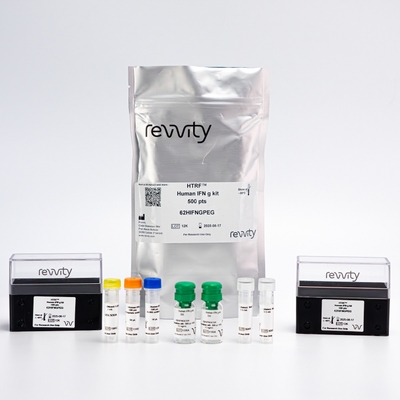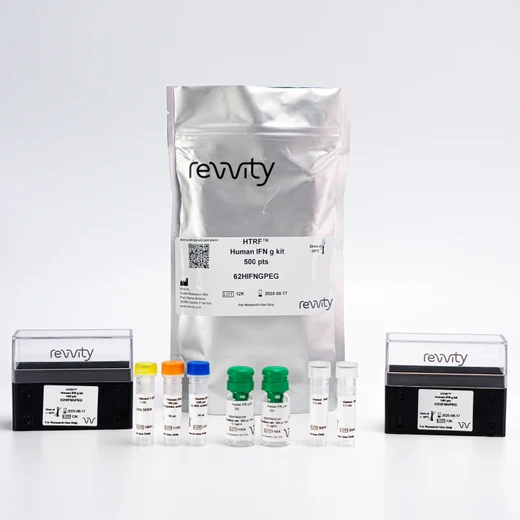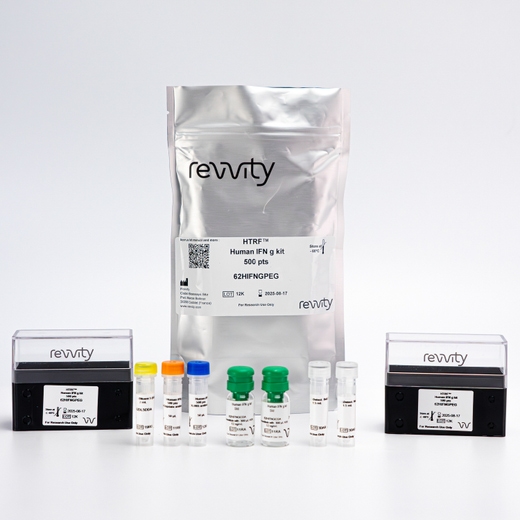

HTRF Human IFN-γ Detection Kit, 500 Assay Points


HTRF Human IFN-γ Detection Kit, 500 Assay Points






The HTRF human IFN gamma kit is designed for the quantification of human IFN gamma release in cell supernatant.
For research use only. Not for use in diagnostic procedures. All products to be used in accordance with applicable laws and regulations including without limitation, consumption and disposal requirements under European REACH regulations (EC 1907/2006).
| Feature | Specification |
|---|---|
| Application | Protein Quantification |
| Sample Volume | 16 µL |
The HTRF human IFN gamma kit is designed for the quantification of human IFN gamma release in cell supernatant.
For research use only. Not for use in diagnostic procedures. All products to be used in accordance with applicable laws and regulations including without limitation, consumption and disposal requirements under European REACH regulations (EC 1907/2006).



HTRF Human IFN-γ Detection Kit, 500 Assay Points



HTRF Human IFN-γ Detection Kit, 500 Assay Points



Product information
Overview
IFN gamma is a pro-inflammatory cytokine secreted by T and NK cells in response to viral infection and or inflammatory conditions. IFN gamma plays a major role in innate and adaptive immunity by promoting T cell differentiation into TH1 and development of Treg, as well as by inhibiting T cell differentiation into TH17. Its anti-tumor properties have been used in treatment of osteoporosis and it is of great interest in immuno-oncology where it improves survival in patients with bladder or ovarian carcinoma.
Assessment of serum samples often requires enhanced sensitivity. In some cases, AlphaLISA assays may have sufficient sensitivity to enable detection of low levels of analytes in serum or plasma.
Specifications
| Application |
Protein Quantification
|
|---|---|
| Brand |
HTRF
|
| Detection Modality |
HTRF
|
| Product Group |
Kit
|
| Sample Volume |
16 µL
|
| Shipping Conditions |
Shipped in Dry Ice
|
| Target Class |
Cytokines
|
| Target Species |
Human
|
| Technology |
TR-FRET
|
| Therapeutic Area |
Oncology & Inflammation
|
| Unit Size |
500 Assay Points
|
Video gallery

HTRF Human IFN-γ Detection Kit, 500 Assay Points

HTRF Human IFN-γ Detection Kit, 500 Assay Points

Citations
How it works
Assay principle
Cell supernatant, sample, or standard is dispensed directly into the assay plate for the detection by HTRF® reagents (384-well low-volume white plate or Cisbio low-volume 96-well plate in 20 µl). The antibodies labeled with the HTRF donor and acceptor are pre-mixed and added in a single dispensing step, to further streamline the assay procedure. The assay can be run up to a 1536-well format by simply resizing each addition volume proportionally.

Assay data analysis
The 4 Parameter Logistic (4PL) curve is commonly recommended for fitting an ELISA standard curve. This regression enables the accurate measurement of an unknown sample across a wider range of concentrations than linear analysis, making it ideally suited to the analysis of biological systems like cytokine releases.
Assay details
Technical specifications of human IFN gamma kit
| Sample size | 16 µL |
|---|---|
| Final assay volume | 20 µL |
| Kit components | Lyophilized standard, frozen detection antibodies, buffers &protocol. |
| LOD &LOQ (in Diluent) | 14 pg/mL &21 pg/mL |
| Range | 21 – 4,000 pg/mL |
| Time to result | Overnight at RT |
| Calibration | NIBSC (82/587) value (IU/mL) = 0,019 x HTRF hIFN? value (pg/mL) |
| Species | Human only |
Analytical performance
Intra and inter assay
Intra-assay (n=24)
| Sample | Mean [IFNg] (pg/mL) | CV |
|---|---|---|
| 1 | 209 | 9% |
| 2 | 835 | 11% |
| 3 | 4367 | 7% |
| Mean CV | 9% |
Each of the 3 samples was measured 24 times, and % CV was calculated for each sample.
Inter-assay (n=4)
| Sample | [IFNg] (pg/mL) | Mean (delta R) | CV |
|---|---|---|---|
| 1 | 98 | 178 | 14% |
| 2 | 432 | 788 | 9% |
| 3 | 1905 | 3170 | 6% |
| Mean CV | 9.7% |
Each of the samples was measured in 4 different experiments, and % CV was calculated for each sample.
Dilutional linearity
The excellent % of recovery obtained from these experiments show the good linearity of the assay.
|
Sample
|
Dilution factor | [IFNg] expected (pg/mL) | [IFNg] detected (pg/mL) | Recovery |
|---|---|---|---|---|
| 1 | 1 | - | 150 | - |
| 2.1 | 72.6 | 66 | 91% | |
| 4.3 | 35 | 30 | 86% | |
| Mean | 88% | |||
| 2 | 1 | - | 1953 | - |
| 2.1 | 942 | 959 | 102% | |
| 4.3 | 454 | 450 | 99% | |
| Mean | 100% |
Spike and recovery
| Sample | [IFNg] added (pg/mL) | [IFNg] expected (pg/mL) | [IFNg] detected (pg/mL) | Recovery |
|---|---|---|---|---|
| 1 | 2,000 | 2,421 | 2,086 | 86% |
| 2 | 2,000 | 3,360 | 3,363 | 100% |
The same amount of recombinant cytokine was added to 2 different serum samples, and the set of responses obtained from a standard curve was compared to the calculated expected values. The ~ 100% of recovery observed validates the sample matrix used for this assay.
Assay validation
IFNg secretion in PBMCs stimulated with PMA and Ionomycin
PBMC plated at 50, 100, 200 and 400 kcells/well were stimulated for 3h with increasing concentrations of PMA (0, 1, 50 ng/mL) added to a 500 ng/mL Ionomycin solution. 16 µL of supernatants were then transferred into a white detection plate (384, low volume) to be analyzed with the Human IFN? Assay.

Resources
Are you looking for resources, click on the resource type to explore further.
PBMCs: Waste no more
There is no reason to waste precious, hard-to-obtain unused cells! This Technical Note shares our internal...


How can we help you?
We are here to answer your questions.






























